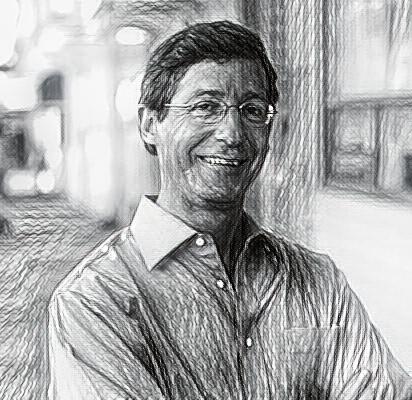Martin Fisher
Thousands of poor citizens of African nations such as Kenya have been able to transform their lives and build successful small businesses because of the ingenious inventions and non-profit support organizations created by Martin Fisher.
Born in England in 1958, Fisher moved with his family to the United States when he was eight years old. He entered Cornell University, where he earned a bachelor’s degree in mechanical engineering in 1979. From there, he pursued graduate studies; he holds masters and doctoral degrees in mechanical design and theoretical and applied mechanics from Stanford University.
Fisher took some time off to travel after finishing his studies in 1985 and was profoundly affected by experiences he had while visiting South America. In Peru, he saw people living in extreme poverty and noted that they were using crude, old-fashioned tools to perform daily tasks, tasks for which simple, new technologies existed elsewhere. He wondered whether having access to these types of tools might help a rural village pull itself up. He realized this was a problem he could devote his life to.
After returning to the United States, he came up with a plan. He traveled to Kenya on a Fulbright Scholarship to study the relationship between technology and poverty. Fisher decided to remain in Kenya after his 10-month Fulbright program was completed. He joined a British non-profit called ActionAid where he helped develop programs such as a rural water project, creating inexpensive construction technologies, building schools, and training women to start their own businesses. He also began working with Nick Moon, with whom he founded ApproTEC (Appropriate Technologies for Enterprise Creation) in Nairobi, Kenya in 1991.
With ApproTEC, Fisher and Moon aimed to create a new model for success in helping impoverished communities in third world countries to pull themselves out of poverty. They believed that, rather than merely being recipients of charity, people in these communities need to be infused with entrepreneurial spirit and given access to modern tools and technology that they could use to build their own businesses. This would allow them to reap their own cash rewards.
They identified a common skill among Kenya’s poor – farming – and began developing tools that would help them to become better farmers. Fisher designed devices such as a press for soil blocks and an oil-seed press before he realized that irrigation technologies would help, more than anything else, to allow farmers to move into commercial-scale farming. This, he knew, would have the greatest impact on their communities.
In 1996, Fisher developed the Super MoneyMaker Pump, inspired by a treadle pump design used in Bangladesh and India. Powered by a human operator, the MoneyMaker pump can pull water from as deep as 30 feet underground and has the ability to irrigate up to two acres of land. Fisher returned to the United States in 2001 and opened a small fundraising office for ApproTEC in San Francisco. The overseas and U.S. offices combined in 2005 to form KickStart, for which Fisher currently serves as co-founder and CEO.
KickStart has since improved the Super MoneyMaker into a lighter weight, durable, rust resistant, and easy to operate pump, the MoneyMaker Max. Put into production in 2012, the MoneyMaker Max replaced the Super MoneyMaker. A less expensive pump, the MoneyMaker Hip Pump, was developed later, retailing for around $70. This pump is easier to operate, allowing a user to pump using his limbs or torso. It can irrigate up to one acre of land. Fisher estimates that by deploying either of the pumps, a farmer can expect to grow enough produce to earn up to $850 a year, almost a 500% increase from their previous annual income of $150.
As of 2014, KickStart has sold 250,000 pumps, created 160,000 enterprises, and moved 820,000 people out of poverty. Many of these farmers may now be considered wealthy, by national standards, and are able to support their families, build better homes, and send their children to school, even college. ApproTEC, meanwhile, grew to include five offices in Kenya and Tanzania with permanent and part-time staff numbering over 100.
Fischer continues to design and invent for KickStart, which makes not only irrigation pumps but also cooking oil presses and construction machinery.
Fisher has been honored with numerous awards for his work, including an IDEA Design Gold Medal, the 2005 Skoll Award for Social Entrepreneurship, and the 2008 Lemelson-MIT Award for Sustainability.


